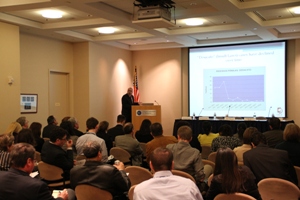 Radio stations, television channels, and newspapers in several Latin American countries have been facing increasing opposition from their leaders in recent months. In Venezuela, which has one of the most authoritarian governments in the region, legislation has been proposed to further restrict the country’s news media by threatening imprisonment of journalists and other media workers for so-called “media crimes.” Soon after this proposal, the Ecuadorian government put forward a similar communications law that would limit freedom of expression. In Bolivia and Nicaragua, journalists critical of the government have faced smear campaigns by official government media outlets that intend to discredit independent reporters.
Radio stations, television channels, and newspapers in several Latin American countries have been facing increasing opposition from their leaders in recent months. In Venezuela, which has one of the most authoritarian governments in the region, legislation has been proposed to further restrict the country’s news media by threatening imprisonment of journalists and other media workers for so-called “media crimes.” Soon after this proposal, the Ecuadorian government put forward a similar communications law that would limit freedom of expression. In Bolivia and Nicaragua, journalists critical of the government have faced smear campaigns by official government media outlets that intend to discredit independent reporters.
How will Venezuelan and Ecuadorian citizens react if these new restrictive laws are passed? Will leaders of Bolivia and Nicaragua also attempt to pass media legislation if Venezuela and Ecuador are successful? How can the international community help limit the repression of media in the region?
Featuring
Milton Coleman
The Washington Post
Carlos Lauría
Committee to Protect Journalists
Carlos Ponce
Consorcio Desarrollo y Justicia (Development and Justice Consortium)
Silvio Waisbord
George Washington University
Download the Presentation
Moderated by
Don Podesta
Center for International Media Assistance
About the Panelists
Milton Coleman has been senior editor of The Washington Post sinceearlier this year andwas previouslydeputy managing editor. He is also treasurer for the Inter American Press Association which is a nonprofit organization devoted to defending freedom of speech and freedom of the press in the Americas. In 1976, Coleman joined The Post as a reporter on the Metropolitan staff. In 1980 he became assistant city editor, and in that same year, he was promoted to city editor. In 1986, Coleman was named assistant managing editor of metropolitan news and directed The Post’s local coverage for the next decade. In 1996, he was promoted to deputy managing editor where he helped to direct coverage and run the Newsroom Personnel Office. Coleman also has been the principal architect of the newspaper’s strategy and development of zoned editions and has helped to lead efforts to improve coverage of Latinos, including news in Spanish.
Carlos Lauría is the senior program coordinator for the Americas at the Committee to Protect Journalists (CPJ). Originally from Argentina, Lauría began his journalism career in Buenos Aires in 1986. In 1994, Lauría settled in New York as U.S. bureau chief correspondent for the country’s largest magazine publisher, Editorial Perfil. He has been the Americas program coordinator at the CPJ since 2002 and is responsible for monitoring, documenting, and developing responses to press freedom violations in Latin America. As chief strategist and spokesperson for CPJ on media issues in the region, he writes regularly on press issues for media throughout Latin America and Europe. He is a journalism graduate of Universidad Católica Argentina.
Carlos Ponce is the general coordinator of the Latin American and Caribbean Network for Democracy. He is the founder and former director of Consorcio Desarrollo y Justicia or “Development and Justice Consortium” and has been an advisor to more than 47 NGOs in Latin America, the Caribbean, and the United States. In the 1990s, Ponce worked in a number of positions for the Venezuelan government and has been promoting human rights and democracy as an activist for more than 20 years. He has been a lecturer at Tufts University since 2005 and was a professor at the Venezuelan Central University. Recently he was appointed as regional advisor to the Andean Region Freedom of Speech Initiative coordinated by the Peruvian NGO Instituto de Defensa Legal (Legal Defense Institute). He is a member of the World Movement for Democracy’s Steering Committee and a member of the Community of Democracies’ International Steering Committee.
Silvio Waisbord is an associate professor and director of graduate studies in the School of Media and Public Affairs at George Washington University. He is the editor of The International Journal of Press/Politics. After receiving his doctorate in sociology from the University of California, San Diego, he became an associate professor at Rutgers University and director of the Journalism Resources Institute. More recently, he was named senior program officer at the Academy for Educational Development. He has also been a fellow at the University of Pennsylvania’s Annenberg School for Communication, the Kellogg Institute for International Studies at Notre Dame University, and the Media Studies Center. He is the author of a number of publications, including Watchdog Journalism in South America: News, Accountability, and Democracy (Columbia University Press), and co-editor of Latin Politics, Global Media (University of Texas Press). His most recent book is the novel Duelo (Duel/In Mourning), published in Spanish.
